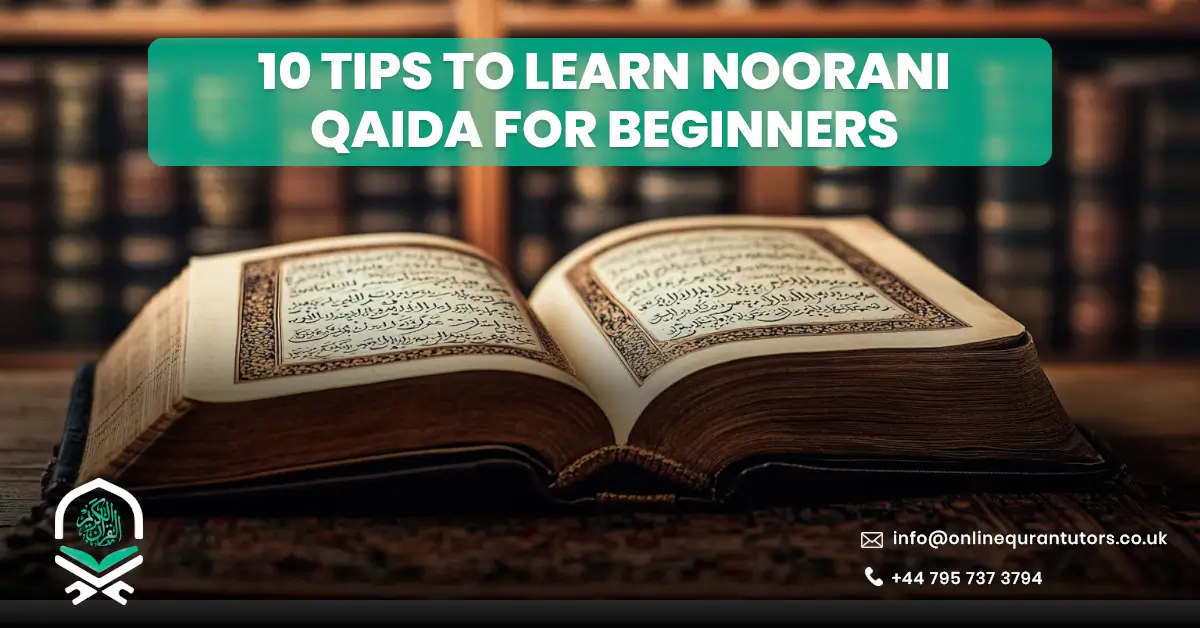Learning to read the Quran accurately is a noble and essential part of every Muslim’s journey. For beginners, especially those who are non-native Arabic speakers, the Noorani Qaida is the ideal starting point. It introduces Arabic letters, phonetics, and Tajweed basics in a structured, easy-to-follow way.
At Online Quran Tutor, we specialize in guiding students of all ages through the Noorani Qaida course. With expert male and female teachers, interactive lessons, and a step-by-step learning methodology, students can master Quranic reading right from the comfort of their home.
Whether you’re a child, adult, or new revert, the tips below will help you make the most of your Noorani Qaida learning journey.
10 Tips to Learn Noorani Qaida for Beginners
1. Choose a Qualified Quran Tutor
The foundation of effective Quran learning lies in having a skilled and certified instructor. An experienced Noorani Qaida teacher helps you avoid pronunciation mistakes, ensures proper Tajweed rules are applied, and adapts lessons according to your pace and learning style.
Our expert tutors have years of experience teaching Quranic Arabic and know how to make learning engaging and result-driven. Whether you’re a beginner or someone looking to refresh your skills, a professional guide makes a noticeable difference in your learning curve.
2. Follow a Daily Learning Schedule
Consistency is essential for mastering Noorani Qaida. Dedicating just 20 to 30 minutes a day helps reinforce previously learned material and keeps you progressing steadily. Inconsistency can result in forgetting important rules and hinder fluency.
To help maintain a routine, we provide flexible class timings so that learners can study at their convenience. Students also benefit from personalized progress tracking and gentle reminders that keep them motivated without adding pressure.
Also Read: 10 Benefits of Learning Noorani Qaida for Beginners
3. Practice Arabic Letters with Makharij
Learning the Arabic alphabet is just the beginning. True mastery comes when each letter is pronounced from its correct point of articulation, known as Makharij. Incorrect pronunciation can change the meaning of Quranic words and affect your recitation accuracy.
Our curriculum includes repeated drills, audio feedback, and mouth-diagram visuals to help students internalize each sound correctly. This attention to detail builds a strong base, making advanced Tajweed much easier to grasp later.
4. Use Interactive Audio & Visual Tools
Interactive learning tools can significantly enhance understanding, especially for younger learners. Audio clips, animated visuals, and color-coded rules help students understand abstract concepts like Sukoon, Tanween, and Harakaat.
To make learning fun and effective, our digital resources incorporate modern e-learning techniques. Students can hear native-level pronunciation, watch engaging videos, and practice at their own pace between classes.
5. Revise Regularly for Better Retention
Repetition is key when it comes to memorizing Arabic sounds and Tajweed rules. Many beginners rush through lessons without revisiting old material, only to struggle later with fluency or pronunciation.
That’s why regular revision is built into our teaching approach. Weekly reviews and mini-quizzes help reinforce previously covered material. Students also receive detailed feedback on recurring errors to ensure solid, long-term retention.
Also Read: How Many Ayahs in Quran? Quick Guide to Verse Count
6. Master Harakaat (Vowel Symbols)
The vowel signs—Fatha, Kasra, and Damma—play a vital role in shaping word pronunciation. Skipping or misreading them can completely alter the meaning of a word in the Quran.
Our Noorani Qaida lessons emphasize slow, accurate reading while applying these vowels. Through targeted exercises and verbal correction, students gain confidence in recognizing and applying Harakaat with precision.
7. Start with Simple Word Formation
Once students are confident with letters and vowels, the next step is forming small words. This stage is a practical application of everything learned and helps transition to reading full Quranic sentences.
Instructors introduce basic words in a supportive setting, guiding learners through each letter and vowel combination. These small wins boost self-confidence and prepare students for the more complex structures ahead.
8. Record Your Recitation and Review
Self-recording is a powerful way to identify and correct mistakes. When you listen to your own recitation, you can pinpoint issues like elongation errors, missed vowels, or unclear articulation.
We encourage students to submit recordings for teacher review. This method has proven highly effective in helping learners gain confidence and accelerate improvement.
9. Be Patient and Stay Consistent
Like any new skill, learning Noorani Qaida requires time, repetition, and persistence. Some letters may be more difficult to pronounce, and mistakes are part of the process.
Our instructors create a supportive environment where students are motivated to stay on track. Encouragement, positive reinforcement, and tracking small achievements go a long way in keeping learners engaged.
Also Read: How Many Surahs Are in the Holy Quran: A Comprehensive Guide
10. Enroll in a Certified Online Noorani Qaida Course
While self-study is useful, a structured curriculum led by expert tutors offers faster and more reliable results. Enrolling in a certified online course ensures proper sequencing, real-time correction, and continuous guidance.
Our academy offers one-on-one Noorani Qaida classes for kids around the globe. With flexible schedules, progress monitoring, and access to male or female teachers, it’s an ideal solution for families seeking quality Quran education at home.
Join Online Quran Tutor UK – Start Your Free Trial Today!
At Online Quran Tutor UK, we’ve designed our Quran with Tajweed Online Course to make learning Tajweed and Quranic rules easier and more effective for online learners of all ages. Our experienced teachers simplify complex Tajweed rules through engaging examples, interactive activities, and easy-to-follow video lessons.
Whether you’re just starting or looking to improve your recitation, we’re here to support you every step of the way.
Courses We Offer:
- Noorani Qaida Course – Learn the fundamentals of Arabic and Quranic pronunciation.
- Online Tajweed Course for Kids – Specially designed for children to learn Tajweed in a fun and interactive way.
- Quran Reading Course – Build fluency and confidence in reading the Quran correctly.
We also offer:
Contact us now to book your free trial class and begin your spiritual journey with expert guidance and flexible learning options!
Conclusion
Mastering Noorani Qaida is the first and most important step in learning to read the Quran. By following these expert tips—such as choosing a qualified tutor, practicing consistently, using audio tools, and enrolling in a structured course—you can build a strong foundation in Quranic Arabic and Tajweed.
Join Online Quran Tutor today and start your journey with the best online Noorani Qaida course. Our experienced tutors, proven methods, and student-centered approach ensure that your Quran learning experience is both rewarding and spiritually uplifting.





